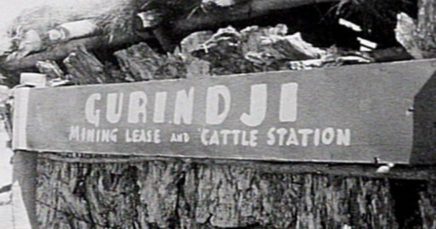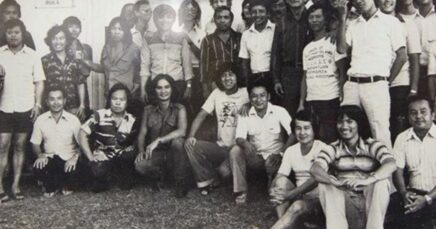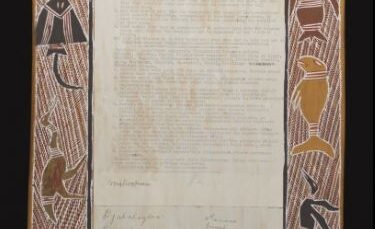WARNING: Aboriginal and Torres Strait Islander readers are warned that the following post may contain images of deceased persons.
On 3 November 2013, the legendary unionist Brian Manning passed away after a lifetime in the struggle. The union movement is proud to remember him and his extraordinary contribution to the cause of social justice.
Brian was born in 1932, amid the Great Depression, in rural Queensland. As a child Brian’s family moved to Brisbane where he completed high school and entered the world of work, having short stints in a number of trades.
In 1956, he moved to Darwin, and in 1966, he started work on the waterside, where he would spend the rest of his working life. Brian was a proud member of the Waterside Workers’ Federation, a precursor to the Maritime Union of Australia. In 1959 he joined the Communist Party – and would be a committed member until its dissolution in 1991.
As a political activist and unionist, Brian demonstrated time and time again the true meaning of solidarity.

One of the most famous examples was his support for the Gurindji Strike, or Wave Hill Walk Off, from 1966 – 1975.
The background to this strike was the campaign for wage equality by Aboriginal and Torres Strait Islander workers. The pastoral industry was a key site of this campaign. In the industry, many Indigenous workers were denied wage equality, and earned around a third of what non-Indigenous workers did.
Brian was appalled by this injustice, and was a founding member of the Northern Territory Council for Aboriginal Rights. This organisation was led by a number of prominent Indigenous activists, such as its Secretary Davis Daniels and his brother, Dexter Daniels who also worked as the Aboriginal Organiser for the North Australian Workers’ Union (NAWU).

Mr Daniels and supporters such as Brian Manning pushed for the NAWU to take a claim for wage equality to the Arbitration Commission. In March 1966 the Commission handed down its decision in favour of equal wages – but in a racist insult to Indigenous workers, deferred this equality until December 1968.
In August of 1966 Vincent Lingiari led 200 Gurindji stockmen and their families off the Wave Hill Pastoral Station owned by the Vestey Group, demanding immediate wage equality. What began as an action for wage equality quickly became a defining moment in the movement for Land Rights.

The NAWU leadership initially resisted supporting the Walk Off, prompting Mr Daniels to take leave from his position with the union. Brian was determined to do what he could to support the Gurindji struggle.
Brian offered practical solidarity. He loaded his truck with food and other supplies and drove from Darwin to the strike camp alongside Mr Daniels and the Indigenous actor and activist Robert Tudawali. It took sixteen hours to drive the hundreds of kilometres.

He later recounted:
“It was a horror stretch consisting of a series of temporary, heavily corrugated diversions which could not be driven at great speed with my overloaded small truck. We crawled along most of the way between 15 and 20 m.p.h. Fortunately I had fitted new ten ply tyres before setting out. Travel on the surface being constructed was not permitted so we did not reach the strikers camp in the dry bed of the Victoria River until 9.30 that night … The nervous cries changed to loud and excited cheers from a swelling crowd around the truck. I could actually sense their relief in the realisation that they were no longer on their own as they had been on a prior occasion and the promise of support was now a reality.”
Throughout the course of the Gurindji’s struggle Brian remained closely connected to the strikers, showing his solidarity however he could. When he became secretary of his union’s NT branch, he pushed the union to act in solidarity with the strike. At the national WWF conference, he was integral in persuading the union to raise a levy on all its members in support of the Gurindji.
In another extraordinary act of practical solidarity, Brian was integral to maintaining a radio link with the East Timorese resistance organisation, FRETILIN amid the invasion of East Timor by the Indonesian military in 1975.
After the invasion of East Timor, the Indonesian military sought to cut communications between FRETILIN and the outside world. In a series of ingenious actions, Manning and his fellow activists in Darwin managed to keep the link alive, even when the Fraser Government and police tried to stop them.

At one point, Brian and his comrades purchased a Single Side Band Radio and a Toyota Coaster and drove around Darwin with an East Timorese activist, Estanislau Da Silva, posing as tourists while they searched for the best signal, all while being tailed by the police.
To try and capture media interest, Manning and his fellow activists decided to launch a new public radio link to Timor. They organised a launch with 15 journalists turning up who would need to be transported to the secret site where the transmitter was being kept.
Before too long, they noticed they were being followed. Managing to lose the tail, Manning and his fellow activists took the journalists to the transmitter. For 90 minutes they were connected to the FRETILIN personnel on the other side of the line. Messages of support were read by Labor MP and prominent supporter of the Timorese, Ken Fry. Journalists could directly interview FRETILIN leaders.
Brian later recalled that after the session a small group of activists removed the transmitter. Then:
“The rest of us walked down the hill to where an irate Radio Inspector with antenna wire trailing out the car door in the company of army and Federal Police exclaimed loudly, “There they are!” Just then the bus pulled up for our drive back to Darwin. As John and Andrew returned to the transmission site, it was crawling with personnel looking for the transmitter. Mission successfully accomplished! A most extraordinary event given that we were followed and frankly were expecting to get rumbled.” (From: Brian Manning, “Charlie India Echo Tango calling Timor Leste”, in Hal Alexander and Phil Griffiths (eds.) A Few Rough Reds, https://roughreds.com/)
For a time, the broadcasts were the only link FRETILIN had outside of Timor, and the only news from the island not controlled by the Indonesian government.
Brian Manning lived a life of solidarity and activism in pursuit of a better world. The Australian union movement is proud to remember him, and continue his legacy of social justice today.
For more information on Brian’s life:
Dr. Julie Kimber has written a biographical chapter on Brian Manning’s life, “Brian Manning: 1932 – 2013“ in the new book Comrades! Lives of Australian Communists. Edited by Bob Boughton, Danny Blackman, Mike Donaldson, Carmel Shute and Bev Symons, (Sydney: SEARCH Foundation and the Australian Society for the Study of Labour History).



